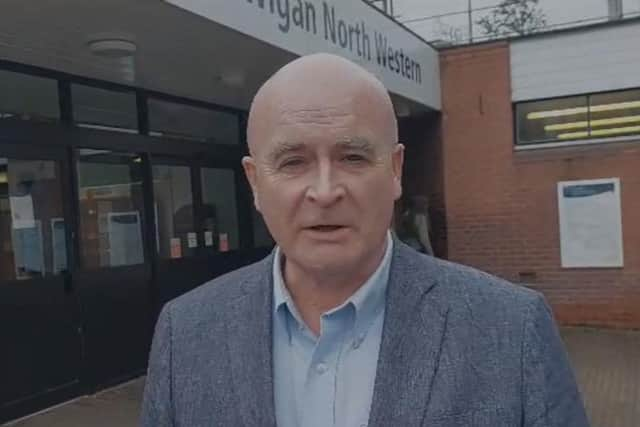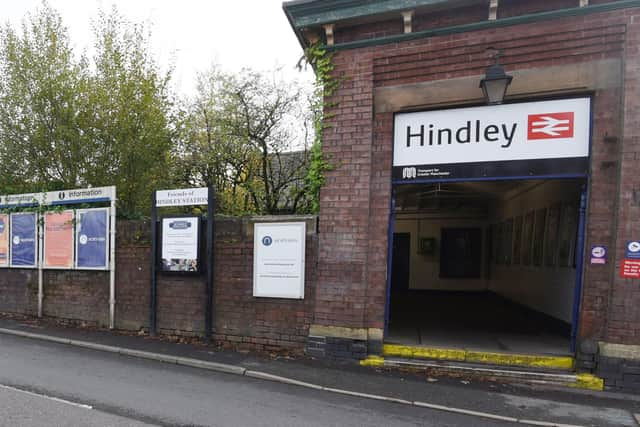Rail ticket office closure consultation slammed as ‘a sham’ by RMT rail union boss
and live on Freeview channel 276
Mick Lynch, general secretary of the Rail, Maritime and Transport (RMT) union, said the process was designed to ensure the plans are implemented despite strong opposition.
More than 680,000 responses were submitted to the consultation, which ended on September 1.
Advertisement
Hide AdAdvertisement
Hide AdThree stations – Wigan North Western, Atherton and Hindley – are due to lose their ticket offices under the controversial proposals put forward by the Rail Delivery Group (RDG) over the summer.


Mr Lynch told the Commons’ Transport Select Committee: “We think the whole thing has been a sham designed to be rammed through while people were looking the other way.
“It all goes back to the Secretary of State (Mark Harper).
“The Secretary of State initiated these changes through the contracts he has with the TOCs (train operating companies).


“He directs everything they do these days, every letter that’s sent, he gets access to.
Advertisement
Hide AdAdvertisement
Hide Ad“Of course, if the watchdogs object (to the closures) on the limited basis they’re allowed to, the decision will end up with him as well.
“It’s a controlled show.
“The whole thing is designed so that they can force this through in a way that they want.”
Katie Pennick, campaigns and communications manager at charity Transport for All, said many people “have not had a fair opportunity” to comment on the proposals.
She told the hearing that many operators did not make consultation documents available in accessible formats such as braille or British Sign Language.
Advertisement
Hide AdAdvertisement
Hide AdMs Pennick said: “Any consultation, but especially one on proposals that will disproportionately impact disabled people, is rendered useless if it’s not accessible to the very people who will be impacted.”
She added: “I’m really disappointed to see the opaqueness of these consultation documents and the number of misleading statements there were in the documents, particularly around staffing.”
Mr Lynch described claims by operators that ticket office staff will be redeployed onto station concourses and platforms as “nonsense”.
He said: “They’re not taking them out of the ticket office to work on the platforms. They’re taking them out of the ticket office to make cuts, to cut the jobs out of the system.”
Advertisement
Hide AdAdvertisement
Hide AdMr Lynch added that staff “will not be there” at off-peak periods, and people travelling then “will be left to fend for themselves”.
Anthony Smith, chief executive of watchdog Transport Focus, which is analysing the consultation responses, told the hearing his organisation is “not in any way opposed to the principle of redeploying staff out of ticket offices onto a more visible role onto stations”.
He said this could benefit many passengers “if done properly”, but warned “it’s got to pass quite a high hurdle”.
Christopher Brooks, head of policy at charity Age UK, told the committee there is a “lack of understanding” about how difficult it is for people who are not internet users to buy tickets from machines at stations.
Advertisement
Hide AdAdvertisement
Hide AdHe said: “It is extremely difficult to expect someone to use a TVM (ticket vending machine) and be able to use the interface, however intuitive some tech savvy designer thinks it is.
“It is very, very difficult, probably impossible, for many, many people who are offline.
“Over a fifth of over-65s are not internet users so to expect people to go into the station and do that is an extremely tall order.”
He added: “There’s a significant number of people, millions of pensioners, who will find it very, very difficult if we go down a more automated route.
Advertisement
Hide AdAdvertisement
Hide Ad“It will obviously have the impact that it will put some people off travelling altogether.”
Mr Smith said: “If it’s the case that the ticket office is either closing or the ticket office is being reduced in hours very significantly, I think the ticket vending machine has got to be able to replicate pretty much what the ticket office can do at the moment.
“So, I think we would argue that you would want to delay (changes) until you’ve got that capacity in place otherwise people are being disadvantaged.
“There are certain types of ticket you can only get at the moment from a ticket office.
Advertisement
Hide AdAdvertisement
Hide Ad“You have to be able to get them from a ticket vending machine.”
He said it was difficult to predict the impact of a widespread closure of ticket offices.
He told MPs: “The impact is very, very hard to judge because some people at the moment turn up at a ticket office because it’s nice and easy, and they can’t be bothered with digital and fiddling around with apps.
“If that option is removed, they may well just move to digital and get on with it.
Advertisement
Hide AdAdvertisement
Hide Ad“There’s a group of people, I think, will find it quite difficult and will need some adjustment and some support.
“There’s probably a group of people who will think ‘I can’t be bothered, it’s just too complicated’.”
The Government and train operators say ticket office staff will be moved from behind screens on to platforms to help passengers once the ticket offices are closed.
The RDG said 12 per cent of train tickets are bought from offices at stations, down from 82 in 1995.
Passengers will be asked to pay for journeys by tapping contactless cards on barriers, using self-service machines, or buying tickets from staff on station concourses or trains if possible.